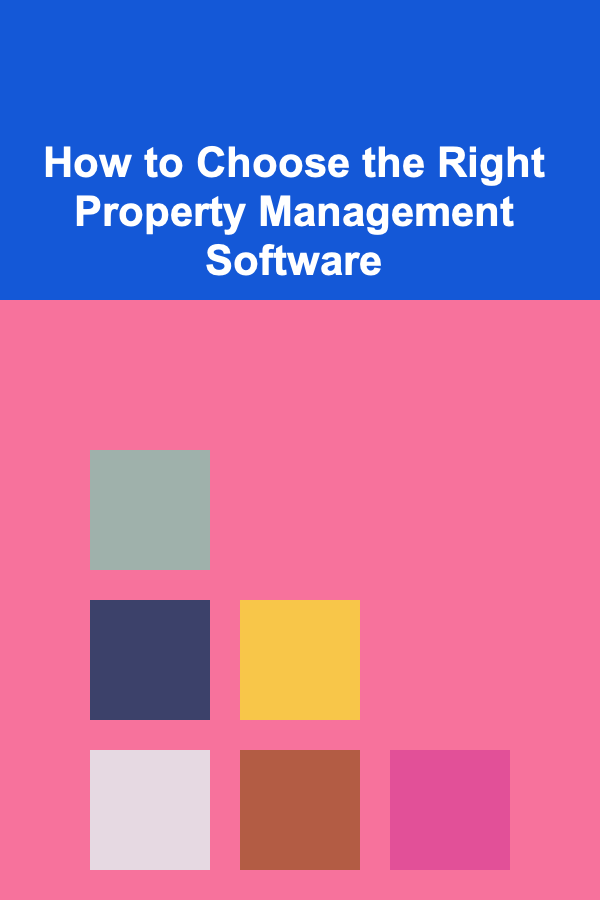
How to Choose the Right Property Management Software
ebook include PDF & Audio bundle (Micro Guide)
$12.99$7.99
Limited Time Offer! Order within the next:

In today's fast-paced and competitive real estate market, property managers are under pressure to streamline operations, provide superior customer service, and maximize the profitability of the properties they manage. Property management software (PMS) has become an essential tool to help property managers achieve these objectives. However, with so many options available, choosing the right property management software can be a daunting task.
This article will guide you through the key factors to consider when selecting property management software, and help you make an informed decision that suits your specific needs.
Understanding the Need for Property Management Software
Before diving into the selection process, it's important to understand why property management software is essential. Property management software is designed to help landlords and property managers handle their day-to-day operations efficiently. Whether you manage residential or commercial properties, these platforms provide tools for leasing, tenant management, rent collection, maintenance tracking, accounting, and more.
The need for property management software arises due to several challenges property managers face:
- Time Efficiency: Managing properties involves a range of tasks that can be time-consuming, from handling maintenance requests to calculating rent and managing tenant inquiries. Automation and streamlined processes offered by PMS can save valuable time.
- Financial Management: Proper accounting is critical for the success of any property management business. PMS can handle billing, tracking expenses, generating financial reports, and ensuring tax compliance, thus reducing the chances of financial errors.
- Tenant and Lease Tracking: Managing tenant information, lease agreements, and payment histories becomes easier with PMS. It centralizes all relevant data and makes it accessible with just a few clicks.
- Communication and Customer Service: The software allows seamless communication with tenants and vendors, enhancing customer satisfaction and promoting tenant retention.
- Compliance and Legal Protection: Keeping track of legal documents, deadlines, and local regulations can be challenging. PMS can help property managers stay compliant with housing laws, lease regulations, and more.
Now, let's explore the key features you should look for when evaluating different property management software options.
Key Features to Look for in Property Management Software
Choosing the right property management software depends on the specific needs of your properties and the features that will make your workflow smoother. Here are the key features to consider:
2.1. Tenant and Lease Tracking
One of the core functionalities of property management software is tenant and lease tracking. This feature allows you to store and manage all tenant-related information, including:
- Tenant contact details
- Lease dates and terms
- Rent payment history
- Communication logs
- Late fees and outstanding balances
With proper lease tracking, you can stay on top of lease renewals, monitor rent payments, and ensure that tenants are meeting their obligations.
2.2. Accounting and Financial Management
Efficient accounting is crucial to the financial health of any property management business. Property management software should offer robust accounting tools to help you manage your finances. Look for the following features:
- Rent Collection: Automate recurring payments, set reminders, and allow tenants to pay online for convenience.
- Expense Tracking: Track operational costs like repairs, property taxes, insurance premiums, and other overheads.
- Invoicing and Receipts: Generate invoices for tenants and receipts for payments, ensuring accurate records.
- Tax Reporting: Property management software can generate reports to help with tax filing, ensuring compliance with tax regulations and maximizing deductions.
A good property management software should integrate with accounting software, making it easier to manage your finances.
2.3. Maintenance Management
Another essential feature is maintenance management. Property managers need to keep track of maintenance requests, schedule repairs, and ensure that work is completed on time. The software should allow tenants to submit maintenance requests online, with the ability to track progress, assign tasks to contractors, and manage related costs.
Key maintenance features include:
- Request Tracking: Tenants can submit and track maintenance requests.
- Work Order Management: Create and assign work orders to contractors or in-house teams.
- Vendor Management: Keep a record of trusted vendors, their contact details, and performance history.
- Maintenance History: Maintain a log of past repairs and upgrades for each unit.
Effective maintenance management reduces downtime, improves tenant satisfaction, and helps maintain the long-term value of your properties.
2.4. Tenant Communication and Customer Service
In property management, maintaining clear communication with tenants is vital for a successful relationship. Property management software should offer tools to facilitate communication:
- Online Portals: Tenants should be able to access an online portal where they can pay rent, submit maintenance requests, view lease documents, and communicate with the property management team.
- Automated Alerts and Notifications: Set up automated reminders for rent due dates, lease renewals, or scheduled maintenance, helping you stay organized and keep tenants informed.
- Messaging System: An internal messaging system allows you to communicate with tenants efficiently without the need for separate email or phone systems.
Effective communication leads to improved tenant retention, reduces misunderstandings, and strengthens the landlord-tenant relationship.
2.5. Document Management
Property managers deal with numerous documents, including lease agreements, contracts, inspection reports, and compliance-related forms. A robust document management system is crucial for securely storing and managing these documents. Look for software that allows you to:
- Store Documents Digitally: Upload and store all important documents in a centralized location.
- Access and Share Documents: Grant access to specific documents when needed, ensuring that both tenants and property managers have the necessary information.
- Digital Signatures: Allow tenants to sign lease agreements or other forms electronically for convenience.
A reliable document management system ensures compliance, reduces paperwork, and improves workflow.
2.6. Mobile Access
In today's mobile-driven world, property managers need software that is accessible on the go. Mobile apps provide flexibility, allowing you to manage your properties from anywhere. Look for property management software that offers a mobile app with:
- Access to Property Data: View tenant information, maintenance requests, and financial reports on your mobile device.
- Rent Payment Processing: Allow tenants to pay rent and make other transactions through the mobile app.
- Task Management: Keep track of your to-do list and tasks, whether it's scheduling maintenance or sending notices to tenants.
Having mobile access to property management tools ensures that you can stay on top of operations no matter where you are.
2.7. Reporting and Analytics
Reporting and analytics features are important for evaluating the financial performance of your properties and identifying areas for improvement. The software should offer customizable reports that help you track key metrics such as:
- Rent collection rates
- Property expenses
- Maintenance costs
- Vacancy rates
- Profitability
With these insights, you can make data-driven decisions to improve efficiency and profitability.
2.8. Scalability
When selecting property management software, it's important to consider your future growth. Look for software that can scale as your portfolio expands. Whether you plan to manage more units, add new property types (e.g., commercial or vacation rentals), or hire additional team members, your PMS should be able to accommodate your evolving needs.
Evaluating User Experience (UX)
The usability of the software is another crucial factor to consider. The software should have an intuitive and user-friendly interface, allowing property managers and tenants to use it with minimal training. A clean design, easy navigation, and quick access to essential features will improve the efficiency of your operations.
Consider the following when evaluating user experience:
- Ease of Use: Does the software have a clean and simple design? Is it easy to navigate for users with little to no technical experience?
- Onboarding Process: How easy is it for new users to get started with the software? Is there adequate support and training available?
- Customer Support: What type of customer support is available? Look for providers offering phone, email, and chat support, as well as a knowledge base for troubleshooting.
A smooth user experience reduces frustration and enhances productivity for property managers and tenants alike.
Integration with Other Systems
Property management software needs to work in harmony with other tools and systems you may already be using, such as accounting software, CRM tools, or marketing platforms. Integration ensures data flows seamlessly between systems, reducing the chances of errors and redundancy.
Key integrations to consider include:
- Accounting Software: Ensure that your PMS integrates with popular accounting platforms like QuickBooks or Xero.
- Payment Gateways: If you want to process online payments, check if the software integrates with payment gateways like PayPal or Stripe.
- CRM Tools: Integrating with customer relationship management tools can streamline lead generation, tenant communication, and leasing processes.
By selecting a property management software that offers seamless integrations, you can improve operational efficiency and avoid data silos.
Security and Data Privacy
Given the sensitive nature of tenant data, security should be a top priority when choosing property management software. Ensure that the software provider follows industry-standard security protocols to protect your data. Features to look for include:
- Data Encryption: Ensure that sensitive information, such as tenant details and payment information, is encrypted during transmission and storage.
- Backup and Recovery: Look for software that automatically backs up data and offers recovery options in case of data loss.
- User Permissions: Set different access levels for different users (e.g., administrators, leasing agents, tenants) to ensure that only authorized individuals can access specific data.
Robust security features protect your business from data breaches and maintain trust with your tenants.
Pricing and Cost-Effectiveness
Finally, the cost of property management software is an important factor to consider. Pricing models vary across providers, with options such as:
- Subscription-Based: A monthly or annual subscription fee based on the number of units or properties managed.
- One-Time Payment: A lump sum payment for lifetime access to the software.
- Freemium: Basic features offered for free, with premium features available at an additional cost.
Consider your budget and evaluate whether the software's pricing is justified by the features and benefits it offers. While cheaper options may seem appealing, they may lack important functionality, leading to inefficiencies in the long run.
Conclusion
Choosing the right property management software is crucial to the success of your property management operations. By carefully considering the key features, user experience, integrations, security, and pricing, you can select software that meets your current needs and scales with your business growth.
Take the time to evaluate multiple software options, request demos, and test their functionality before making a final decision. The right software will not only help you manage properties more effectively but will also enhance tenant satisfaction, streamline operations, and ultimately improve your bottom line.
Reading More From Our Other Websites
- [Home Security 101] How to Prepare Your Home for Natural Disasters and Emergency Situations
- [Personal Care Tips 101] How to Properly Wash Your Face Using a Facial Cleanser
- [Home Staging 101] How to Stage a Home to Appeal to Millennials
- [Digital Decluttering Tip 101] The Ultimate Guide to Building an Efficient Virtual Workspace
- [Home Party Planning 101] How to Plan a Cozy Holiday Party in Your Home
- [Rock Climbing Tip 101] Best Night‑Climbing Gear for Bioluminescent Cave Expeditions
- [Tie-Dyeing Tip 101] Color Theory Meets Chemistry: How Bleach Alters Fabric for Stunning Tie-Dye Effects
- [Home Space Saving 101] How to Decorate and Organize Your Small Balcony for Maximum Space Efficiency
- [Organization Tip 101] How to Keep Track of Laundry Cycles with a Chart
- [Home Lighting 101] How to Use Lighting to Make Your Home More Pet-Friendly

Discovering Hidden Gems: Free Entertainment Options You've Never Tried
Read More
How to Implement the One-In-One-Out Rule for Clutter Control
Read More
Why Organizing Your Digital Photos is Essential for Memories
Read More
How to Master Rope Skills for Climbing
Read More
How to Explore Gene Therapy and Its Potential
Read More
How to Choose the Right Belt to Cinch Your Waist: A Comprehensive Guide
Read MoreOther Products

Discovering Hidden Gems: Free Entertainment Options You've Never Tried
Read More
How to Implement the One-In-One-Out Rule for Clutter Control
Read More
Why Organizing Your Digital Photos is Essential for Memories
Read More
How to Master Rope Skills for Climbing
Read More
How to Explore Gene Therapy and Its Potential
Read More